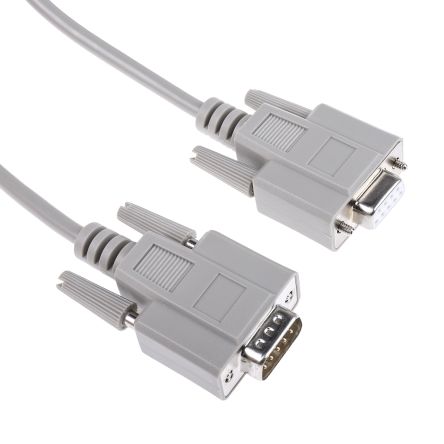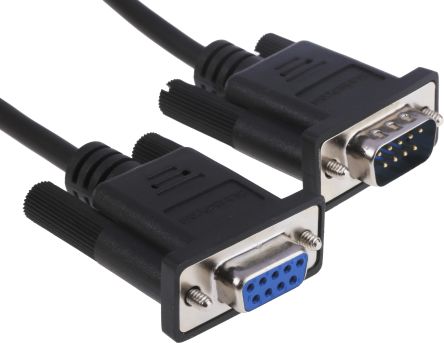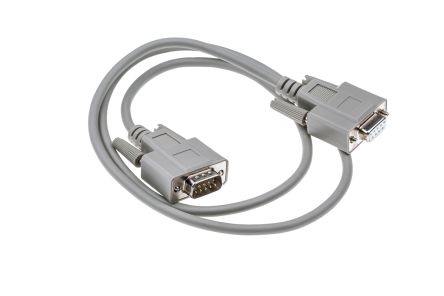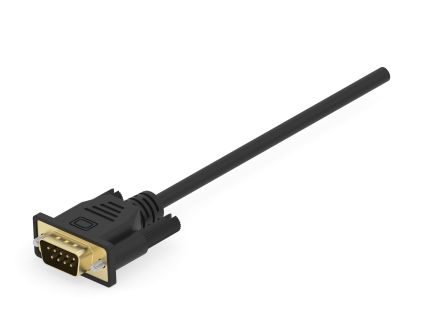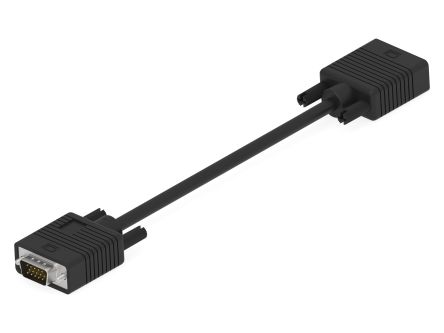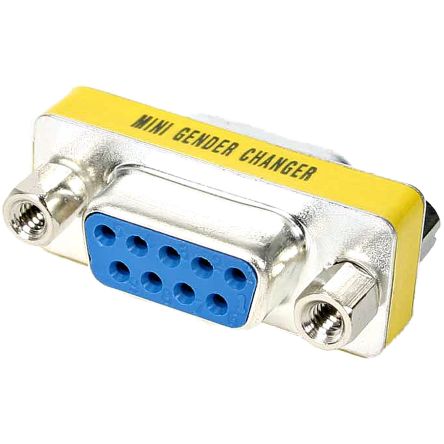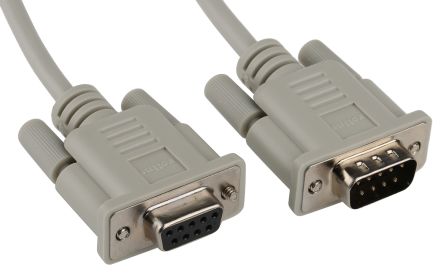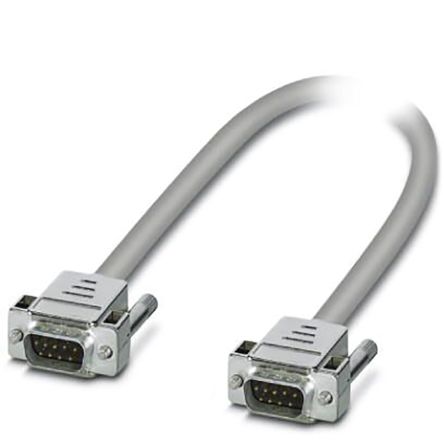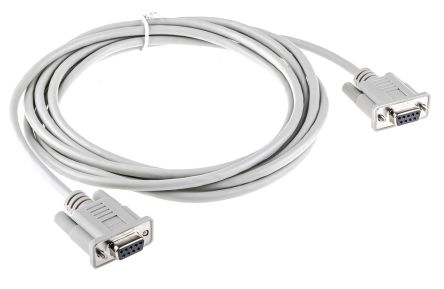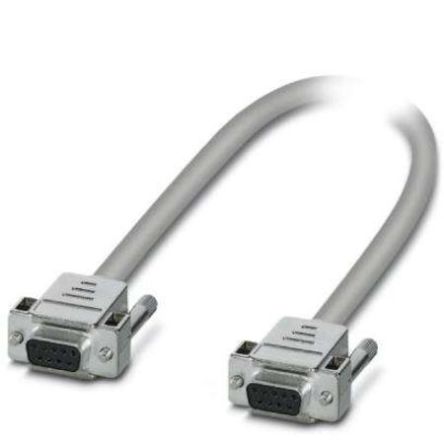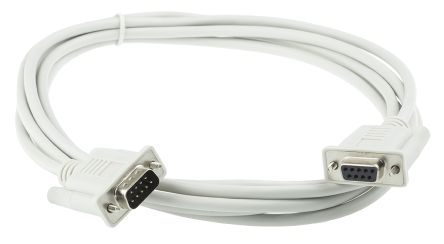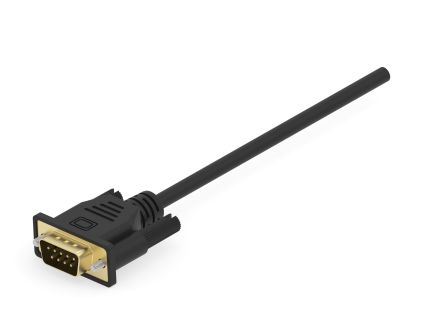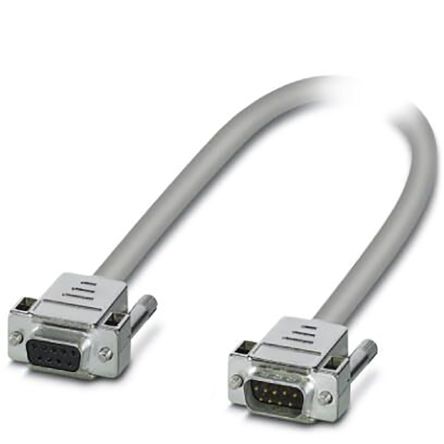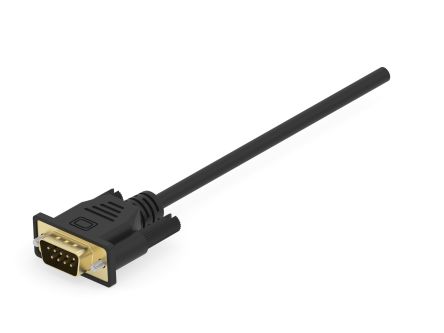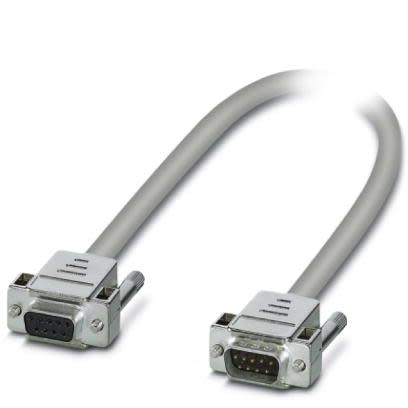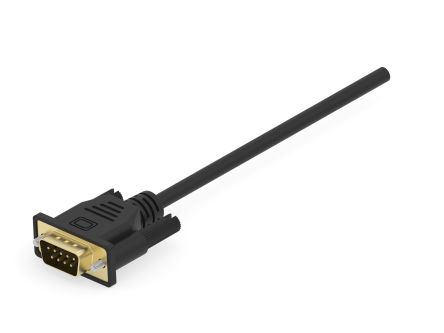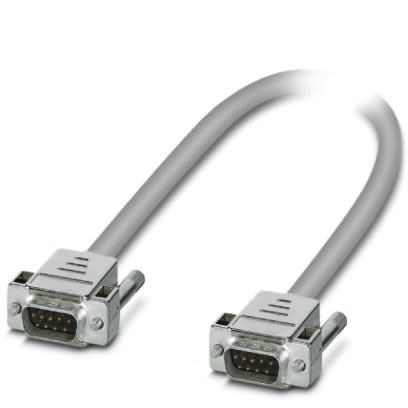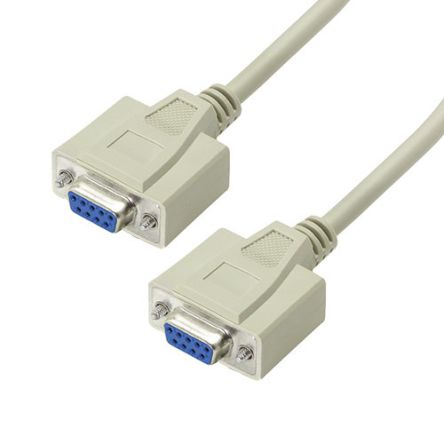- Automation & Control Gear
- Cables & Wires
- Enclosures & Server Racks
- Fuses & Circuit Breakers
- HVAC, Fans & Thermal Management
- Lighting
- Relays & Signal Conditioning
- Switches
- Batteries & Chargers
- Connectors
- Displays & Optoelectronics
- ESD Control, Cleanroom & PCB Prototyping
- Passive Components
- Power Supplies & Transformers
- Raspberry Pi, Arduino, ROCK, STEM Education & Development Tools
- Semiconductors
DB9 Cables
Serial cables are specialised computer cables used for data transfer and communication between devices. They employ serial communication protocols, transmitting data one bit at a time, often utilising the RS-232 (Recommended Standard 232) interface standard. While newer technologies like Ethernet, USB, and wireless connections have replaced serial cables in many applications, they remain vital in specific industrial and legacy systems, offering a reliable and cost-effective solution for data transmission and device control.
Technical Specifications:
- Electrical Characteristics: Serial cables adhere to RS-232 specifications, supporting data transfer rates and voltage levels suitable for various devices.
- Shielding: Shielded serial cables minimise electromagnetic interference (EMI) and radio frequency interference (RFI), ensuring signal integrity and reliable data transmission.
- Connector Types: Serial cables typically terminate with D-subminiature connectors, either DB9 (9-pin) or DB25 (25-pin), available in both male (plug) and female (socket) configurations.
How Are RS 232 Cables Made?
RS232 cables are typically constructed using shielded cables to minimise electromagnetic interference and ensure signal integrity. They are terminated with D-subminiature connectors, commonly in DB9 (9-pin) or DB25 (25-pin) configurations. These connectors can be either male (plugs) or female (sockets). Cable ends often incorporate strain relief for added flexibility.
Cable Configurations:
- Straight-Through Cables: The most common configuration used for connecting a DTE (Data Terminal Equipment) device (e.g., a computer) to a DCE (Data Communication Equipment) device (e.g., a modem).
- Null Modem Cables: These cables allow direct connection between two DTE devices (e.g., two computers) without the need for a modem. They achieve this by crossing specific wires within the cable.
- Custom Cables: For specialised applications, custom serial cables can be configured with specific pinouts or connector types to meet unique requirements.
What Are Serial Cables Used for?
Although serial cables have been replaced in some areas by Ethernet, wireless and USB connector technologies, they are still used in some applications. The cable assemblies connect computers to printers, PLCs to HMIs, input and output modules and even motor drives. With the help of adapters, it is still possible for devices to communicate with each other using old and new standards.
Types of Serial Cable Assemblies
Serial cables come in various configurations to cater to different applications and devices:
- Basic DTE-DCE Cables: These cables provide universal compatibility, connecting DTE devices (like computers) to DCE devices (like modems).
- Null Modem Cables: Designed for direct communication between two DTE devices, eliminating the need for a modem.
- V.35 Crossover Cables: These cables enable high-speed data transfer between compatible devices, offering enhanced data rates and faster communication.
- Serial Printer Cables: Specifically designed for connecting computers to printers with serial port interfaces.
Troubleshooting and Best Practices for Serial Cables
To ensure optimal performance and longevity of your serial cable connections, follow these recommendations:
- Check Cable Compatibility: Verify that your serial cable is compatible with the devices you are connecting. Pay attention to pin configurations, gender, and any specific requirements for your application.
- Secure Connections: Ensure that the connectors are properly plugged in and the locking mechanisms (if present) are engaged to prevent accidental disconnection.
- Minimise Cable Length: Shorter cables generally offer better signal integrity. Avoid using excessively long cables unless necessary.
- Avoid Interference: Keep serial cables away from sources of electromagnetic interference, such as power cables and motors. If necessary, use shielded cables to minimise interference.
- Regular Inspection: Periodically inspect cables for signs of wear and tear, such as frayed insulation or damaged connectors. Replace any damaged cables promptly to avoid communication issues.
Serial Cables vs Other Cable Types
Serial cables offer unique characteristics compared to other communication cables:
- Serial vs. USB: Serial cables provide a simple and reliable connection for legacy devices, while USB cables offers faster data transfer rates and plug-and-play functionality for modern peripherals.
- Serial vs. Ethernet: Ethernet cables offer significantly higher data transfer speeds and network connectivity, whereas serial cables are suitable for point-to-point communication with legacy devices or industrial applications.
- Serial vs. Other Interfaces: Serial cables maintain their relevance in specific industrial and legacy applications, while other interfaces like HDMI, DisplayPort, and FireWire cater to specialised needs like high-definition video and audio transmission.
Each cable type has its strengths and weaknesses, making the choice dependent on the specific requirements of your application.
Industry Applications
Serial cables continue to play a vital role in various industries:
- Discrete Manufacturing: In manufacturing environments, serial cables connect machinery, control panels, and automation systems, enabling communication and data transfer between devices.
- Process Manufacturing: Serial cables are used in process control systems to connect sensors, actuators, and other devices, facilitating real-time monitoring and control of industrial processes.
- Energy and Utilities: In power plants and substations, serial cables are used for communication between control systems, monitoring equipment, and protective relays.
- Facilities and Intralogistics: Serial cables enable communication between control systems and material handling equipment in warehouses and logistics operations, ensuring smooth and efficient workflows.
Your Trusted Serial Cables Supplier & Manufacturer
RS offers prompt delivery of serial cables and connectors in Australia. Choose from a wide selection of quality serial cables from top brands like Phoenix Contact, TE Connectivity, and RS PRO. For more information on our delivery services and fees, please refer to our Delivery page.
Popular Searches
Related links
- StarTech.com Female 9 Pin D-sub to Male 9 Pin D-sub Serial Cable, 3m PVC
- RS PRO RS232 USB A Male to DB-9 Male Converter Cable
- Roline Male 9 Pin D-sub to Female 9 Pin D-sub Serial Cable, 10m
- RS PRO Female 9 Pin D-sub to Female 9 Pin D-sub Serial Cable, 2m PVC
- StarTech.com Male 9 Pin D-sub to Male 3.5mm Stereo Jack Serial...
- RS PRO Male 9 Pin D-sub to Male 9 Pin D-sub Serial Cable, 2m PVC
- Roline Male 25 Pin D-sub to Female 9 Pin D-sub Serial Cable, 1.8m
- FTDI Chip RS232 USB A Female to DB-9 Male Converter Cable
